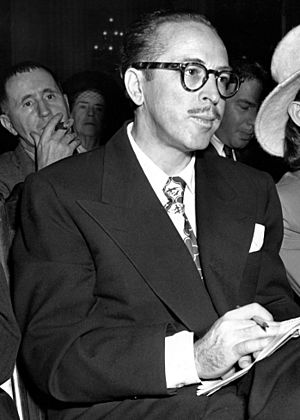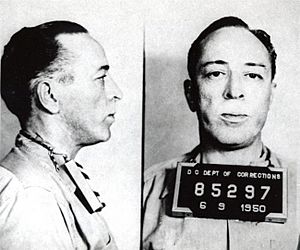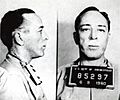Dalton Trumbo facts for kids
Quick facts for kids
Dalton Trumbo
|
|
|---|---|

Trumbo at the House Un-American Activities Committee hearings in 1947
|
|
| Born | James Dalton Trumbo December 9, 1905 Montrose, Colorado, U.S. |
| Died | September 10, 1976 (aged 70) Los Angeles, California, U.S. |
| Occupation |
|
| Spouse |
Cleo Beth Fincher
(m. 1938) |
| Children | 3, including Christopher |
James Dalton Trumbo (born December 9, 1905 – died September 10, 1976) was a famous American screenwriter. He wrote many popular and award-winning movies. Some of his well-known films include Roman Holiday (1953), Exodus, and Spartacus (both 1960).
Dalton Trumbo was one of the "Hollywood Ten". This was a group of people in the film industry who refused to answer questions from the House Un-American Activities Committee (HUAC) in 1947. This committee was investigating if there were Communist influences in Hollywood.
Because he refused to testify, Trumbo and hundreds of others were put on a "blacklist" by Hollywood. This meant they were not allowed to work openly in the film industry. But Trumbo kept writing movies in secret. He used fake names or had other writers pretend to be the author. His secret work won two Academy Awards for Best Story. One was for Roman Holiday (1953) and the other for The Brave One (1956).
In 1960, he finally received public credit for Exodus and Spartacus. This helped to end the Hollywood Blacklist for Trumbo and many other writers. Years later, in 2011, he was officially given full credit for Roman Holiday.
Dalton Trumbo: A Famous Screenwriter
Early Life and Dreams
Dalton Trumbo was born in Montrose, Colorado, in 1905. His family moved to Grand Junction, Colorado when he was three. His father worked hard but the family was often poor.
Dalton went to Grand Junction High School. While still in high school, he worked as a young reporter for a local newspaper. He covered stories about courts, schools, and local events. He later attended the University of Colorado and continued working as a reporter.
In 1924, his family moved to California. Soon after, his father became sick and passed away. Dalton had to support his mother and siblings. For nine years, he worked at night wrapping bread in a bakery. During the day, he studied at the University of California, Los Angeles and the University of Southern California. He spent this time writing many stories and novels, but they were all rejected at first.
Becoming a Writer
Trumbo started his professional writing career in the early 1930s. His articles and stories began appearing in popular magazines. In 1934, he became an editor for the Hollywood Spectator magazine. Later, he started working for Warner Bros. studio.
His first novel, Eclipse, was published in 1935. It was about a town and its people, inspired by his years in Grand Junction. The book caused some debate in his hometown.
Trumbo began working in movies in 1937. He also kept writing books. His novel Johnny Got His Gun won an award in 1939. This powerful anti-war book was inspired by a story he read about a soldier who lost all his limbs in World War I.
By the late 1930s and early 1940s, Trumbo became one of Hollywood's highest-paid screenwriters. He worked on films like Thirty Seconds Over Tokyo (1944) and Kitty Foyle (1940). For Kitty Foyle, he was nominated for an Academy Award.
The Hollywood Blacklist Era
What Was the Blacklist?
In the 1940s, there was a lot of fear about Communism in the United States. The House Un-American Activities Committee (HUAC) began investigating people in Hollywood. They wanted to know if anyone was a Communist or was spreading Communist ideas through films.
In 1946, a newspaper publisher named William R. Wilkerson started naming people he believed were Communist sympathizers. This list became known as "Billy's Blacklist." In October 1947, HUAC called Trumbo and nine other writers to testify.
Trumbo's Stand and Punishment
Trumbo and the others refused to answer questions about their political beliefs or name other people. They believed this was against their First Amendment rights (freedom of speech). Because they refused, they were found guilty of "contempt of Congress."
Trumbo served eleven months in a federal penitentiary in 1950. The film industry then issued a statement saying that Trumbo and others would not be allowed to work unless they denied being Communists. This was the start of the "Hollywood Blacklist."
Working in Secret
After his release, Trumbo had to sell his ranch. He moved his family to Mexico City. There, he continued to write scripts in secret. He wrote about 30 screenplays using different fake names, called "pseudonyms." Sometimes, other writers would pretend to be the author of his scripts. This was called being a "front."
For example, he wrote The Brave One (1956) under the name Robert Rich. This film won an Academy Award for Best Story, but Trumbo could not claim it. He also wrote Roman Holiday (1953), which also won an Oscar, but it was given to a "front" writer.
The Blacklist Ends
Slowly, the power of the blacklist began to fade. In 1960, director Otto Preminger gave Trumbo credit for the screenplay of his film Exodus. Soon after, actor Kirk Douglas announced that Trumbo had written the screenplay for Stanley Kubrick's film Spartacus.
These actions by Preminger and Douglas helped to break the blacklist. Trumbo was allowed to work openly again. He was given credit for all his future scripts. In 2011, the Writers Guild officially gave him full credit for Roman Holiday, almost 60 years after the movie was made. In 1975, Trumbo finally received his Oscar for The Brave One.
Trumbo also directed the 1971 film version of his own novel, Johnny Got His Gun. One of his last films, Executive Action (1973), was about the Kennedy assassination.
Personal Life
In 1938, Dalton Trumbo married Cleo Fincher. They had three children: Nikola, Christopher, and Melissa (Mitzi). Christopher Trumbo later became a filmmaker and an expert on the Hollywood blacklist. Mitzi Trumbo became a photographer.
Cleo Trumbo passed away in 2009 at the age of 93.
Legacy and Recognition
Dalton Trumbo died in Los Angeles from a heart attack in 1976, at age 70.
In 1993, Trumbo was officially given the Academy Award for writing Roman Holiday. A new Oscar statue was made for him because the original one, given to the "front" writer, was not returned.
His son, Christopher Trumbo, created an Off-Broadway play in 2003 based on his father's letters. It was called Trumbo: Red, White and Blacklisted. He also made a documentary film about his father in 2007.
In 2015, a movie called Trumbo was released. It starred Bryan Cranston as Dalton Trumbo. Cranston was nominated for an Academy Award for his role.
More than a hundred years after his birth, a statue of Dalton Trumbo was placed in his hometown of Grand Junction, Colorado. It shows him writing a screenplay in a bathtub, which was a habit of his!
Images for kids
-
Trumbo at the House Un-American Activities Committee hearings in 1947
Selected Works
Films He Wrote
- Road Gang, 1936
- Love Begins at 20, 1936
- Devil's Playground, 1937
- Fugitives for a Night, 1938
- A Man to Remember, 1938
- Five Came Back, 1939
- Curtain Call, 1940
- A Bill of Divorcement, 1940
- Kitty Foyle, 1940
- The Lone Wolf Strikes, 1940
- You Belong to Me, 1941
- The Remarkable Andrew, 1942
- Tender Comrade, 1944
- A Guy Named Joe, 1944
- Thirty Seconds Over Tokyo, 1944
- Our Vines Have Tender Grapes, 1945
- Gun Crazy, 1950 (co-writer, uncredited)
- He Ran All the Way, 1951 (co-writer, uncredited)
- Rocketship X-M, 1951 (uncredited)
- The Prowler, 1951 (uncredited)
- Roman Holiday, 1953 (uncredited)
- They Were So Young 1954, (under pseudonym)
- The Boss, 1956 (uncredited)
- The Brave One, 1956 (under pseudonym)
- The Green-Eyed Blonde, 1957 (uncredited)
- From the Earth to the Moon, 1958 (co-writer, uncredited)
- Cowboy, 1958 (uncredited)
- Spartacus, 1960
- Exodus, 1960
- The Last Sunset, 1961
- Town Without Pity, 1961
- Lonely are the Brave, 1962
- The Sandpiper, 1965
- Hawaii, 1966
- The Fixer, 1968
- Johnny Got His Gun, 1971 (also directed)
- The Horsemen, 1971
- F.T.A., 1972
- Executive Action, 1973
- Papillon, 1973
Books and Plays
- Eclipse, 1935 (novel)
- Washington Jitters, 1936 (novel)
- Johnny Got His Gun, 1939 (novel)
- The Remarkable Andrew, 1940 (novel)
- The Biggest Thief in Town, 1949 (play)
- The Time Out of the Toad, 1972 (essays)
- Night of the Aurochs, 1979 (unfinished novel, published after his death)
See also
 In Spanish: Dalton Trumbo para niños
In Spanish: Dalton Trumbo para niños




